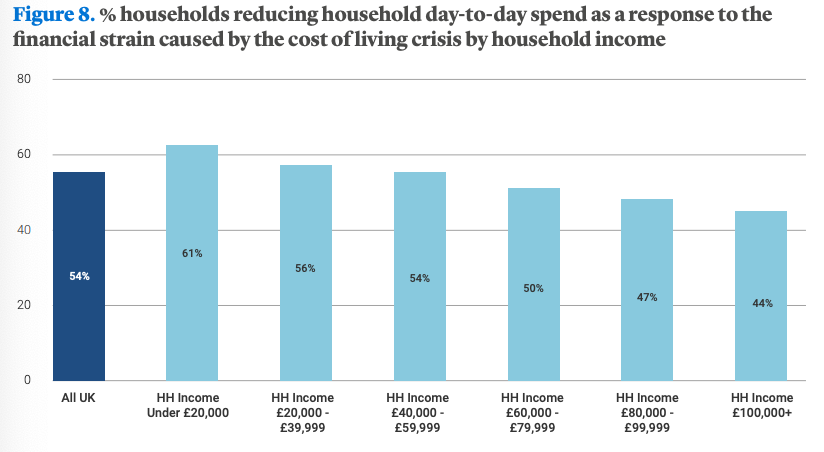📊 The state of play on levelling-up
L&G and Sir Nigel Wilson on levelling-up + HS2 costs + York restaurant
The table above is from Legal & General’s latest Rebuilding Britain Index, which it produces with H/Advisors. The report is a useful way to track the mood of the economy outside London and the progress of levelling-up.
The numbers in the chart represent the score for each category and region of the UK. Each category represents a key component of the local economy, with an overall score at the top. The colours show how these scores have changed compared to the previous quarter. Green means the score is up, red means it is down. As you can see, there is plenty of red. The only green is in the “jobs and economic prosperity index”, a reflection that unemployment remains low and has dropped further in some regions, and the “digital index”, a reflection of investment in new technology. There has been no improvement in the overall scores, with drops for the West Midlands and Northern Ireland. The national score is 65, the same as the previous quarter, and only just above the 64 it stood at in the first report in April 2021.
Given these scores it is no surprise that Sir Nigel Wilson, the outgoing boss of L&G, has said that levelling-up is “failing”.
L&G and Sir Nigel have spoken constantly about the importance of levelling-up and investing in the UK outside London. Sir Nigel, who is from the north-east, has backed this up with actual investment. As I mentioned on Friday, L&G has partnered with Bruntwood to develop science and technology facilities in the north of England through Bruntwood SciTech. Indeed, L&G says in the new report that it has invested more than £30 billion in towns and cities across the UK in recent years. Another recent project is the development of new two offices in Sunderland city centre, Maker and Faber. Sir Nigel visited the city for the topping out of these buildings last month. More on that here.
The impact of inflation hangs over the new report, which is based on survey responses from 20,000 households and national economic data. The graph below shows the percentage of households reducing day-to-day spending because of the rising cost of living. As you can see, those with a lower household income (HH income) are being hit the most…
Sir Nigel made the comments about levelling-up “failing” in a new interview with the Financial Times. He also warned that the turmoil in the banking sector could make it even harder to boost the UK economy outside London. He said:
“Will the banking issues have an impact? Yes, because lending is going to be more difficult, there’s less risk-taking capital in the banking system. Along with higher rates, plus the general uncertainty about valuations, that’s going to cause issues.”
The full story is here.
The L&G report touches on a collection of key factors that are needed to level-up the UK economy. It says:
It remains our view that, while the public purse will be a vital component in addressing these inequalities, far more needs to be done to put the weight of private capital to work in support of those ambitions.
And also:
On investment, we need a more targeted, collaborative and joined-up strategy, over a longer period of time.
On devolution, greater powers need to be given to people who know their areas best, allowing local leaders to take the decisions which will have the best outcome for them.
On housing, we need a significant change of approach to how we build and heat our houses and buildings.
The UK needs to stop playing on the fringes if it is serious about levelling-up. A more ambitious and fundamental approach is required.
Many of these comments chime with what Bruntwood’s Chris Oglesby said in our piece on Friday about Manchester and the north. You can read those comments here. They also chime with much of what I have written in Off to Lunch over the last year, which I summarised last week in a column for The Times. You can read that here.
For those interested in reading more, the full L&G report is here
Other stories that matter…
The National Audit Office has warned that the government’s decision to delay HS2 and the development of a station at Euston in central London will increase the cost of the project. This is yet another example of how this project has suffered from muddled thinking. Story and full report attached (BBC) (NAO)
The Economist has looked at the legacy of the 1963 report on the future of railways by Richard Beeching, which remains controversial today because it recommended that thousands of stations needed to be closed and tracks removed. The report correctly identified the big problems with the UK’s railways, the article says, but closing stations was not the right solution and it was a mistake that many areas still struggle with today (The Economist)
The average price of a hotel room in Liverpool on the night of the Eurovision Song Contest is £2,276, according to a new report, a sign of how the city’s economy looks set to benefit from hosting the event (The Business Desk)
The Anglo-French oil company Perenco says that an oil leak in Poole Harbour has been stopped and is now being contained. The spill was declared a major incident by local authorities on Sunday (Reuters)
A piece from The Athletic on how Manchester-based sportswear brand Castore has expanded so quickly and got its brand on the shirts of Andy Murray, Newcastle United, Sevilla as well as many more players and teams (The Athletic)
The author and economics professor Tyler Cowen says we have been “living in a bubble outside of history” in recent years because of the lack of armed conflict around the world and the absence of truly radical technological change. That is going to change with the arrival of AI, he writes, and it creates all sorts of questions (Marginal Revolution)
On a similar note, this is a fascinating TV news clip from 1999 that looks at the scepticism around Amazon being valued at more than Sears and whether a “couple of geeks who sketched out some software” can really transform retail. At this point Amazon was yet to make a profit. The narrator in the clip says: “Sceptics say it would have to sell every book being sold in the world today to justify its share price.” Life comes at you fast…
The Times’ obituary of Gordon Moore, co-founder of Intel, contains some fascinating insights into his life. Moore was behind the concept of Moore’s Law, the idea that the power of computers would double every year, which he later revised to every two years. Moore’s team also developed a faster voice synthesiser for Stephen Hawking, the piece points out. Intel was founded in 1968 in California and is one of the foundations of Silicon Valley. Without it, so much else doesn’t follow. By the late 1990s Intel’s Pentium chip was powering 90 per cent of the world’s desktop computers, an extraordinary level of dominance (The Times)
For a round-up of the news and analysis in the Sunday papers check-out our press review, which was sent to paying members on Sunday. You can sign-up and read it here.
And finally…
A restaurant for you to visit in York when it opens. King Charles and Queen Camilla are visiting York next week and when they do they will be opening a new restaurant called the York Minster Refectory. The restaurant will be in the grounds of the Minster and is backed by Michelin-starred Yorkshire chef Andrew Pern…

Thanks for reading. If you enjoy Off to Lunch then please share it with others and spread the word. If this newsletter was shared with you then please sign-up below to become a member, get Off to Lunch sent directly to your inbox, attend our forthcoming events and contribute to the work of Off to Lunch
Best
Graham







